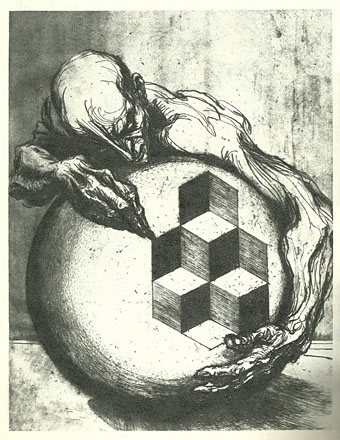Nite Flights (1978) by The Walker Brothers. Cover design by Hipgnosis.
something attacked the earth last nite
with a kick that man habit-eye
cut the sleep tight boys who dreamed and dreamed
of a city like the sky
Scott Walker quotes Brion Gysin (and who knows what else) in Shutout (see below), one of the four remarkable songs he wrote for the final Walker Brothers album, Nite Flights. That album cast a shadow over David Bowie’s Lodger a year later, and led Bowie to try his hand at a cover of the title track in 1993.
• Frédéric Chaubin’s photographs of what he calls Cosmic Communist Constructions. Also a new book from Taschen, and an exhibition at the Karlsruhe Museum of Contemporary Art. PingMag interviewed Chaubin back in 2006.

From Disparate works by Romanian artist Marcel Chirnoaga (1930–2008). See also the Virtual Museum of Marcel Chirnoaga.
The immense size of modern databases gives us a feeling of meaninglessness. Information in such quantities reminds us of Borges’s library extending infinitely in all directions. It is our task as humans to bring meaning back into this wasteland.
Freeman Dyson on The Information: A History, a Theory, a Flood by James Gleick.
• In the Tumblr labyrinth this week: Mr Rossignol, the Elephant House for Edward Gorey, and Brion Gysin.
• Related to the last, Mutate or Die is “a bioart project being conceived of and executed by Tony Allard and Adam Zaretsky”.
• Barry Miles’s top 10 counterculture books. Related: Rick Poynor on Richard Neville’s Playpower.
“The sooner literary fiction recognises & accepts its generic identity, the sooner it can get help.”
• Is YouTube user “Kosinski” the ever-elusive Chris Marker? “All signs point to yes.”
• The Internet Archive is making its books available to US libraries.
• The Castle of Shadows at BLDGBLOG.
• The Light Painting Pool at Flickr.
• Scott Walker (with the Walker Brothers): Shutout |Nite Flights | The Electrician.


I also love this other article at BLDGBLOG: http://bldgblog.blogspot.com/2011/02/computational-mythologies-interview.html
Ah, almost always good to see a quote from demigod Mike Harrison.* His praise of Picador & Virago Modern Classics brought a smile to my otherwise hideous face.
(*To avoid the appearance of outright worship, I must say, “Light & Nova Swing: what was he thinking?”)
Nathalie: Yes, his interviews are always very good, and I hadn’t seen those Pogány pics before. He has China Miéville as a guest soon which should be interesting.
Matthew: I’ll read anything of Harrison’s so I’m over-biased. Light was the first “proper” sf book (ie: far future, spaceships, etc) I’d read in years. I loved it, and especially enjoyed that it upset many hard sf readers. And Nova Swing pressed favourable buttons by extending the Roadside Picnic/Stalker idea. His forthcoming novel is set in the same future, apparently.
I wasn’t aware that Light had upset hard sf readers. What didn’t they like? Were they afraid it displayed their unsavoury tastes a little too clearly?
I, too, will read anything by MJH, but I’m not entirely convinced by his post-Climbers career. I was ecstatic when Climbers came out. It seemed to be the pay-off to his long and obscurely-motivated (even after reading Parietal Games) struggle with fantasy: a book almost entirely purged of the fantastic–“sitting around waiting for people to fall off of mountains” is how I recall him describing its gestation period–but which threatened to erupt into the bizarre at any moment. Utterly, utterly brilliant, and it seemed like a battle had been won, and that he might go anywhere next–anywhere else that is.
I didn’t get on with The Course of the Heart at all. I’m willing to believe the fault is mine, and that if I understood better MJH’s problem with writing what isn’t (which is surely more complex than fantasy=escapism), I’d be closer to appreciating it.
Signs of Life was eminently readable, it excited me, and I bought copies for friends, but it seemed to be picking at the wound I’d thought Climbers and stories like “A Young Man’s Journey to Viriconium/London” had closed. And it seemed a bit blokey–maybe that’d been there all along, and I just hadn’t seen it before. The book-length focus on a “sick” woman was queasy, as Henry James treatment of women is: it seems under-interrogated, and the author seems too much for the torture. Still, no one else would have written the thing–probably no one else could have–, and who’d not love his prose?
Light seemed to me to lack tension and to be cobbled together out of other people’s “futures” (chaos theory & VR? really?); at times I wondered if he was intending to pastiche Wilhelmina Baird. Was it Farah Mendlesohn who said that in Light MJH forgave fantasy? Perhaps he did, and perhaps it doesn’t suit him, even though the time to wrestle with it seems long over. “Still,” I thought, “It’s just one book, and the next one will be quite different.”
(Reading Light drained me of my will to revisit and to catch up on the short stories, and that is a terrible thing. Again, though, the failing is mine: they are still there to be read & to be wondered at.)
Then the man who said, “A series by me does exist, but a sub-crustal, a Borgesian series,” [that’s from memory, and it might not be entirely accurate] gives us not only another book seeming straightforwardly to share a setting with Light, but threatens a third in Pearlant. An honest-to-god trilogy? Yipes!
If I seem to complain too much, know that: [a] I’m an idiot; [b] I complain about pretty much everything, saving only Joanna Russ & Jane Ira Bloom; [c] MJH neither knows nor cares what I think, and that’s just the way I like it.
I forget the specifics of the complaints against Light, much of this was aired (or linked) on long-dead message boards, but there was the usual stuff about unsympathetic characters (I always hear Nabokov guffawing in the distance when that moan gets trotted out), and the way Billy Anker’s name drew attention to the book as an authored text. You can easily gauge the tenor of the struggles people have with Harrison’s generic works by reading the comments on Amazon. I always took the title of Light as a signifier with the additional meaning of the opposite of “heavy”. Rather than attempt to paraphrase the author’s intentions, it’s easier to read something like this which (looking over it again) addresses a few of your comments, I think.
Re: the sick women, there are many of them, as far back as Fay Glass in A Storm of Wings. I think he said once he didn’t know why this was a recurrent motif. As to The Course of the Heart (which features another one…) I need to re-read that but for now I still prefer the short stories which fed into it: ‘The Incalling’, ‘Egnaro’, ‘The Great God Pan’, etc, but that might be because I’ve read some of those several times. I do like the way he works in short doses, however, the concentration of everything makes the work all the more intense. The Viriconium cycle reaches a peak with the short stories, especially ‘Viriconium Knights’ which is almost the entire cycle crammed into (or summarised) in a few pages. I liked with Light the way there were bits of those stories coming through in the present day strand; and the Shrander harks back to the later Viriconium pieces. That dialogue between the works adds to their fascination.
You’re right about the sick women, of course. The most obvious example is “The New Rays”, which I loved–if it is possible to love something that disturbing. Signs of Life aestheticises suffering in a way I’d not expected from MJH. It may be that I’m out of tune with his sense of humour, missing bitter ironies (and the points of those ironies).
I’d read the sfsite thing before, but it was worth reading again for passages such as:
Not that that’s my idea of fun: far too “physical”, far too dangerous. Makes a great metaphor, though, and for great writing in MJH’s purged, achieved style: “If it didn’t, you were supposed to stop. None of us ever did.”
Both of those seem to bear out your light-rather-than-heavy thesis, but I’m not sure how happily they sit together, as they seem to threaten to add up to, “Is this the kind of shit you morons want? Well, here it is.” Is it not The Centauri Device come again?
It is not that I don’t enjoy “proper” SF: Russ’s We Who Are About To …, Malzberg’s Beyond Apollo, Arnason’s Ring of Swords. But the most recent of those is 18 years old, and maybe its season has passed. I’m unconvinced by Banks, Stross, Rajaniemi, et al. I suspect they don’t really see what they’re doing as problematic, so they fail.
Light seems too close to being a flip, po-mo space opera, an act of bad faith. Not making something of the condition of falling, but just surfing the tract. And if anyone ever saw the whole enterprise as problematic, …
Unsympathetic characters: yup, and imagine meeting someone who found Heinlein’s protagonists sympathetic; I’d be sprinting for the nearest exit.
The book as authored text: as if there were any other kind:
So Homer is too much the modernist for these people. We may have to euthanase them.
A bold conjecture: when the enfant terrible starts writing about cats, it’s all up. Not that Burroughs is bad company to be in, but … (Disch bucked the trend by extending his sympathy, slyly, to an incontinent dog. But that’s Disch for you.)
The Shrander: yeah, but he got so much more mileage from a simple horse’s-skull-on-a-stick, didn’t he? Ah, “Strange Great Sins”!
I am a believer, when it comes to Mike Harrison, but gods exist only to be argued with, after all.
And I don’t know how I resisted:
(Oh, look, I didn’t.)
Are Light and Nova Swing really examples of Harrison following his own advice?
Interesting to note Walker’s quoting of Gysin. I’m thoroughly convinced of his lyrical genius. Nite Flights was just the beginning of an incredible arc. Can’t wait to hear his music for the Jean Cocteau at Covent Garden later this year. Walker sings a brief musical quotation from Varese on The Drift.
Have been looking forward to Chaubin’s book for some time, can only hope it approaches the brilliance of Pare’s The Lost Vanguard. The online previews I’ve seen don’t appear to include any internal or close-up images, hope that’s not the case. Speaking of such wonders, have you seen this? http://fzz.cc/issue02PART.html
Matthew: I suppose you’d have to ask Harrison about any apparent contradiction between his statements and his work. As before, I wouldn’t dare to try and paraphrase his intentions.
Colin: That quote always fascinated me partly because people seemed to have missed a connection but also for its offering a clue to some of his later work. It implies that some of those lyrics may be cut-ups rather than telegraphs from an internal landscape. His later work is so unique you can’t help but wonder at some of the processes behind it all. I hadn’t heard about the Cocteau thing, thanks for the tip!
I’d not seen those monuments, thanks for that as well. Makes you wonder what else is out there.